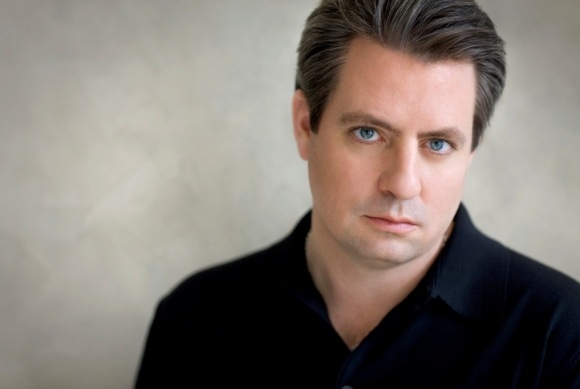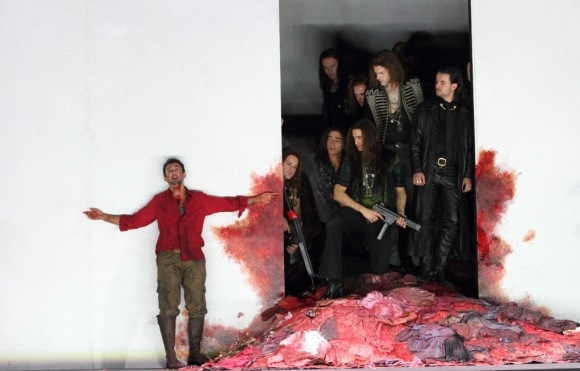Matthew Polenzani, the Royal Opera's Idomeneo

© Dario Acosta
The American tenor is straight down to business, galvanised by his work even after a strenuous day’s rehearsal. The Martin he refers to is Austrian director Martin Kušej, and it’s no secret that his ideas for Mozart’s opera are likely to prove controversial. The Royal Opera’s own notes warn us that in his production "Idomeneo is a tyrannical ruler, who rather than being controlled by the gods makes use of the idea of them to prevent his son establishing a more liberal regime".
If Mozart’s being rewritten, though, Polenzani seems unfazed. "It isn’t set in a specific time. The dress is modern but the set is very spartan and the crux of the opera is a little different from what we normally see. Idomeneo himself is kind of like Tony Soprano! I’ve started to work out how to delve into the character – it’s a learning experience.
"Working with Martin and Marc [Marc Minkowski, the conductor] has been very amiable, and we have a lovely cast full of good people to be around. The director has encouraged us to challenge him in order to help us understand how to get to where we’re going. And people have said that it’s riveting – you will be entertained!"
By now we’re sitting down in the stark dressing room that he shares, alternately rather than simultaneously, with Plácido Domingo. A George Orwell-style tannoy blares show calls at us every few minutes. "You can’t turn it off" says the Illinois-born singer, glumly.
'I’m constantly trying to refine my voice to keep it even'
Polenzani is blest with one of the most naturally even and beautiful tenor voices around, and I ask him how much of that is down to nature and how much to nurture. He blushes at the compliment before answering. "Every singer is their own worst critic and I doubt that anyone would name their own voice like that, not even Jonas Kaufmann or René Pape, but that’s very lovely – thanks!
"I’d say it’s probably about half and half. I had to learn what nature gave me and I didn’t really start to understand vocal production at its core until I was about 24 or 25. I was singing but I didn’t know what I was doing. Then I learnt more about how to produce a tone evenly and healthily and that is an ongoing process. Over time the voice naturally darkens and deepens and gets bigger, and as you switch repertories you need to understand how to make your voice work in multiple ways.
"My vocal coach is Laura Brooks Rice, who teaches at Rider University, but the person who really got me going with the nuts and bolts of singing was Margaret Harshaw, a very famous Wagnerian soprano of the 40s and 50s. I imagine that if Birgit Nillson hadn’t existed Harshaw would have been a much bigger name. When she died in 1997 I went to Laura because she had been with her for 15-20 years and I wanted to stay with someone whose ears were informed by her teaching.
"Half the battle for a voice teacher is being able to speak in a language the singer understands. I believe that the ways we arrive at good technique are as individual as the way we look. A teacher needs to say things maybe 500 ways before it finally clicks.
"My repertory varies from Idomeneo and the other Mozarts to Lucia and Werther and Hoffmann and The Damnation of Faust… I find myself in a lot of different places. So I’m constantly trying to refine my voice to keep it even.
"I have a wide repertory but if you look how many times I’ve sung something you’d be surprised at how few it is. I’ve given, say, 90 performances in my life of Don Ottavio [in Don Giovanni] and that’s the most of any part. Traviata is probably just behind that. I’m sure I give fewer performances than most people at this stage in their career. I’m very careful about that and I never, even now, give more than 50 performances in a year. I like my summertime free because I have little children. I might go to Verona or Salzburg so that makes it interesting, but otherwise I treasure the time when I can be at home, be a dad and play golf.
"I sang Tebaldo this year [in Bellini’s I Capuleti e i Montecchi] which is like being on vacation while you’re singing! It requires very little work, and you have one of the best duets – with Romeo – that Bellini ever wrote."
'I have designs on Captain Vere in Billy Budd. His music is godly'
Polenzani has made hundreds of appearances at New York’s Metropolitan Opera. "It is like a home to me. I’ve had a lot of great experiences there, like Julie Taymor’s Magic Flute which was so brilliantly realised, and there’s some great stuff coming my way over the next four or five years.
"In terms of rep I’m adding La bohème in a couple of years’ time. It’s music that moves my soul. I think that Werther is no less heavy and The Damnation of Faust maybe even a little heavier, and I find those things very comfortable – so I’m going to try it.
"But I won’t change anything about the way I run my career. I’ve avoided Bohème up to now because once you start down that road it’s difficult to step back from it. Companies love their Aidas and Bohèmes and Carmens – they’re the pieces that put people in seats – so if you’ve done it successfully you get asked for it again and again, and I didn’t want to be in the boat of having to say yes to it a lot. I’d rather keep saying yes to Tamino in The Magic Flute! I have designs on Peter Grimes, too, and definitely Captain Vere [in Billy Budd]. His music is godly. I love it so much.
"I never got to do The Rake’s Progress and now at 46 I’m probably too old. I regret that. Do I think I’m ever going to sing Otello? Not really, but who knows? My voice is changing all the time."











